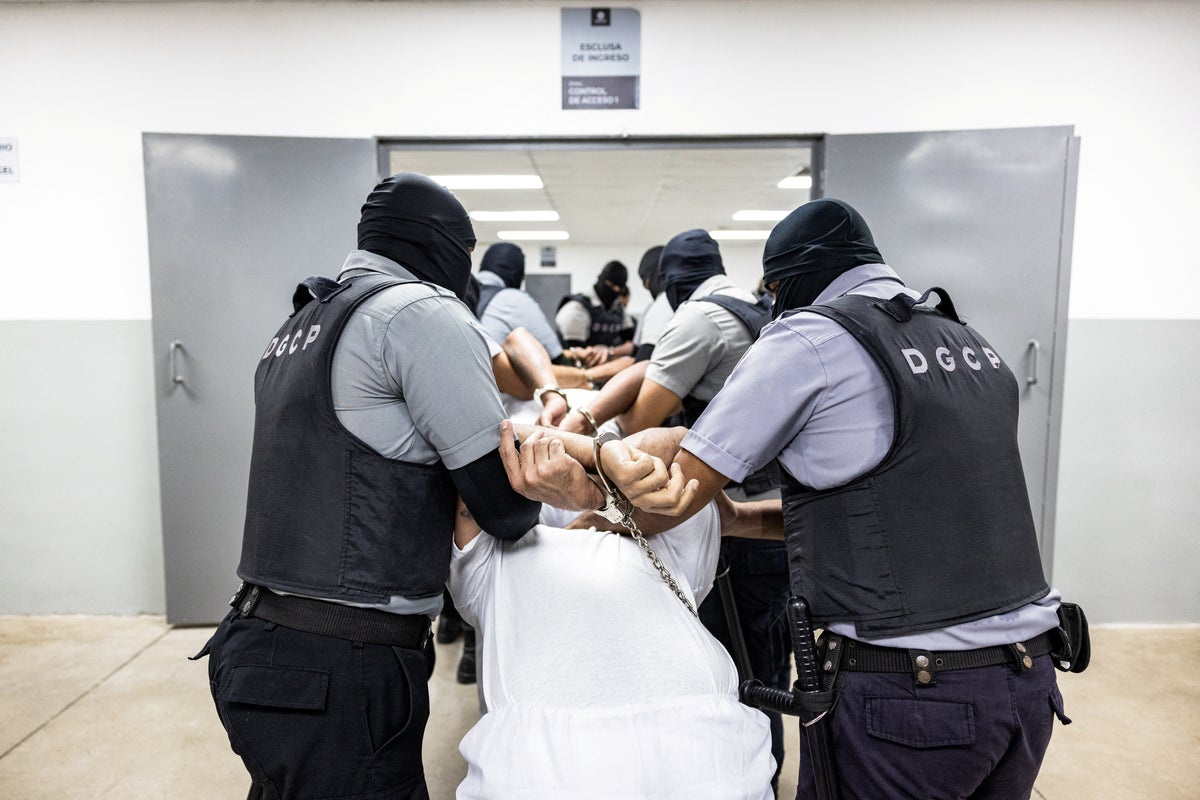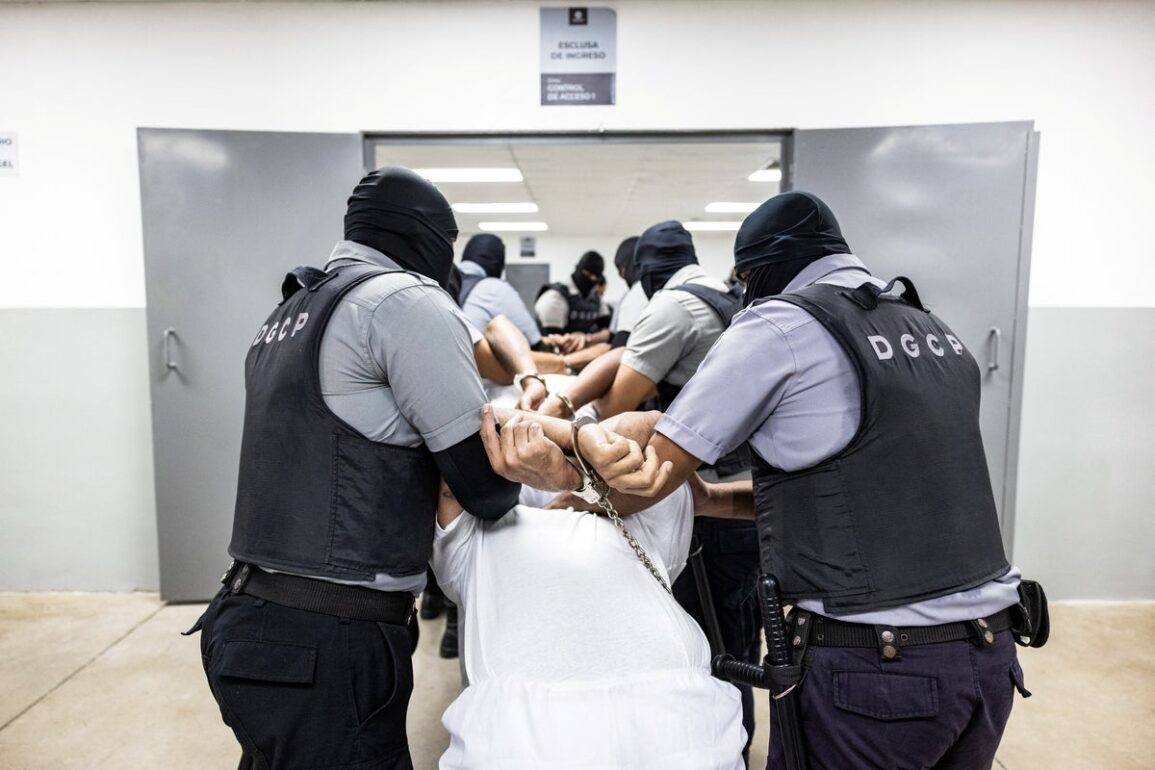
Donald Trump has repeatedly endorsed the idea of sending U.S. citizens to prisons in El Salvador, following a proposal from Salvadoran president Nayib Bukele, who is jailing dozens of deported Venezuelan immigrants in a notorious prison.
But the president’s desire is plainly illegal. There is no constitutional or statutory authority to exile citizens in foreign prisons, and banishing citizens from the country and incarcerating them abroad amounts to an unconstitutional assault on human rights, according to immigration law experts and constitutional scholars.
Trump and administration officials have not offered up any specific plans, or clarified whether he is only referring to naturalized citizens who were not born in the United States.
But Trump’s suggestion that citizens can be imprisoned in foreign jails shows how “absolutely critical it is for the courts to put an immediate stop to this extrajudicial imprisonment by foreign proxy,” according to David J. Bier, director of immigration studies at the libertarian Cato Institute.
“U.S. citizens may not be deported to imprisonment abroad,” he told NBC News. “There is no authority for that in any U.S. law.”
Bukele has already agreed to jail dozens of immigrants summarily removed from the United States inside a notorious prison complex that human rights groups have labeled a “tropical gulag” following reports of abuse, torture and lack of medical attention for inmates in densely packed cells. Inmates there face the prospect of indefinite detention.
The State Department arranged a $6 million deal with Bukele — the self-described “world’s coolest dictator” — to jail hundreds of immigrants removed from the United States inside the Terrorism Confinement Center, or CECOT, despite U.S. law barring financial support in the form of “units of foreign security forces” that face credible accusations of human rights abuses.
Inside the Oval Office alongside Bukele on April 14, Trump said “homegrowns” should be next.
“The homegrowns. You gotta build about five more places,” he said. “It’s not big enough.”
“I just asked the president — it’s this massive complex that he built, jail complex — I said, ‘Can you build some more of them please?’ As many as we can get out of our country,” Trump told reporters.
Pressed on whether that means incarcerating American citizens in El Salvador, Trump said “I’m all for it.”
Trump said he spoke with Attorney General Pam Bondi to determine how to legally deport and incarcerate American citizens out of the country.
“I’d like to go a step further. I said to Pam — I don’t know what the laws are, we always have to obey the laws — but we also have homegrown criminals that push people into subways, that hit elderly ladies on the back of the head with a baseball bat when they’re not looking, that are absolute monsters,” Trump told reporters. “I’d like to include them in the group of people to get them out of the country. But you’ll have to be looking at the laws.”
But the law is already clear, according to legal experts.
“It is pretty obviously illegal and unconstitutional,” according to Ilya Somin, a professor at George Mason University’s Antonin Scalia Law School.
“It’s constitutionally very problematic, if not illegal,” University of Virginia immigration law professor Amanda Frost “It’s a baseline right of citizenship that you can remain in the country.”
It’s also illegal to expatriate U.S. citizens for a crime, according to Lauren-Brooke Eisen, senior director of the justice program at the Brennan Center for Justice at NYU Law.
“In fact, U.S. citizens can only be stripped of citizenship if they knowingly perform acts resulting in a voluntary relinquishment of citizenship such as a ‘formal renunciation of nationality in the United States during a time of war’ or ‘leaving or remaining outside the United States during a time of war or national emergency to avoid military service,’” according to Eisen.
Trump administration officials have been publicly mulling whether to send Americans to El Salvador’s prisons since at least February.
“There are obviously legalities involved. We have a Constitution,” Secretary of State Marco Rubio said at the time. “But it’s a very generous offer. No one’s ever made an offer like that — and to outsource, at a fraction of the cost, at least some of the most dangerous and violent criminals that we have in the United States … But obviously, the administration will have to make a decision.”
“Bukele is undoubtedly trolling, but to emphasize again: this is so incredibly illegal that there’s not even a hint of a possible way to do it under any circumstances whatsoever,” Aaron Reichlin-Melnick, senior fellow at the American Immigration Council think tank, wrote at the time. “It violates international law and the U.S. constitution. Period. End of story.”
Trump later said he would be “fine” and “very happy” with sending incarcerated Americans to El Salvador’s jails, which Elon Musk also called a “great idea.” On April 6, Trump told reporters he “loves” the idea of jailing American “wise guys” in El Salvador.
“I love that,” Trump said. “If we could take some of our 20-time wiseguys that push people into subways and hit people over the back of the head and then purposely run people over in cars — if he would take them, I would be honored to give them.”
Courts have affirmed constitutional protections ensuring Americans cannot be stripped of their citizenship for criminal convictions, meaning incarcerated citizens cannot be kicked out of the country, whether or not they’re imprisoned.
“I know of nothing that would give the president the authority to force U.S. citizens serving federal prison sentences to serve their time in a different country’s prisons,” law professor M. Isabel Medina with Loyola University New Orleans College of Law told The Independent earlier this year.
There is also nothing in federal law that would give the Bureau of Prisons discretion to send citizens outside of the federal corrections system.
“Thus, anyone enmeshed in the federal criminal justice system — certainly including the very very bad people Trump says he would like to send to prison in El Salvador — must be housed (and cared for) by the Bureau of Prisons,” according to Cornell Law School professor Michael C. Dorf.
“To be sure, the statute nowhere says that the federal Bureau of Prisons must operate all of its facilities in the United States, but crucially, it must operate, manage, and regulate all prisons or other facilities that house U.S. prisoners,” Dorf writes. “It might, in theory, be possible for the Bureau of Prisons to operate a prison on foreign soil, but if so, it would have to be a U.S. prison operating under U.S. standards. Shipping U.S. prisoners to a prison operated by a foreign sovereign — as Trump proposes to do — would be plainly unlawful.”
Even if Congress tried to rewrite federal law to hand citizens to a foreign government, constitutional safeguards would still apply, according to Dorf.
“Other than the lack of statutory authority, another complication would be application of the Eighth Amendment, procedural due process, First Amendment and other constitutional protections that federal prisoners are entitled to while serving their sentences,” Medina told The Independent.
“Because the constitutional authority to create federal crimes lies with Congress, not the executive, and because U.S. citizens may not be deported, even if imprisoned, it would appear to be illegal for the president to do this particularly without any statutory authority,” she said.
It’s also a scenario that Supreme Court Justice Sonia Sotomayor warned about in a dissent to the court’s divided ruling that partially blocked the Trump administration from summarily deporting alleged Venezuelan members of Tren de Aragua under the Alien Enemies Act without a court hearing.
“The implication of the Government’s position is that not only noncitizens but also United States citizens could be taken off the streets, forced onto planes, and confined to foreign prisons with no opportunity for redress,” she wrote. “History is no stranger to such lawless regimes, but this Nation’s system of laws is designed to prevent, not enable, their rise.”
This story was first published on February 2 and has been updated with developments
This post was originally published on this site be sure to check out more of their content.







